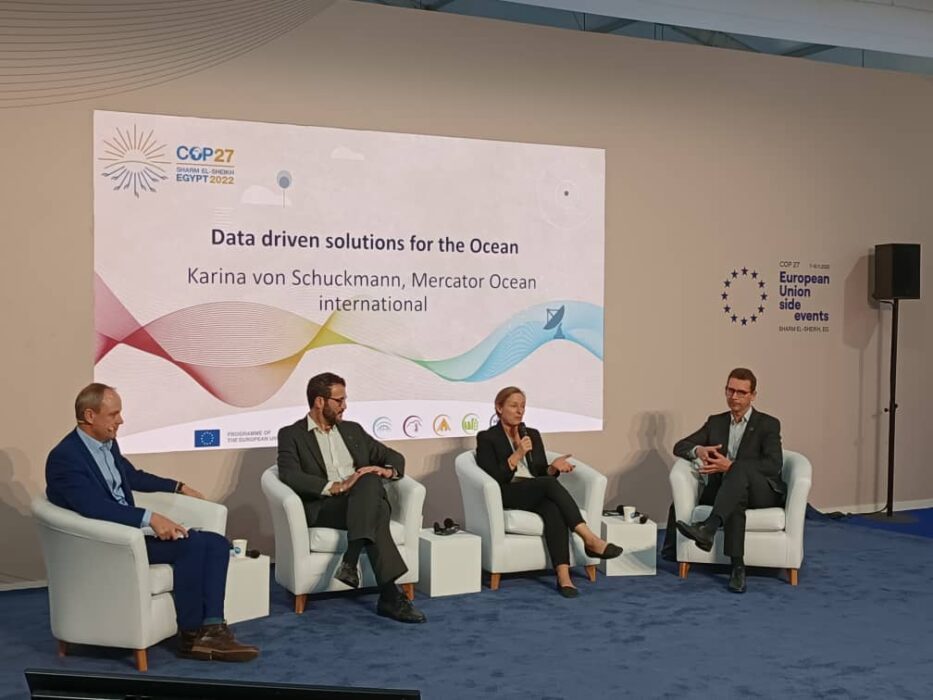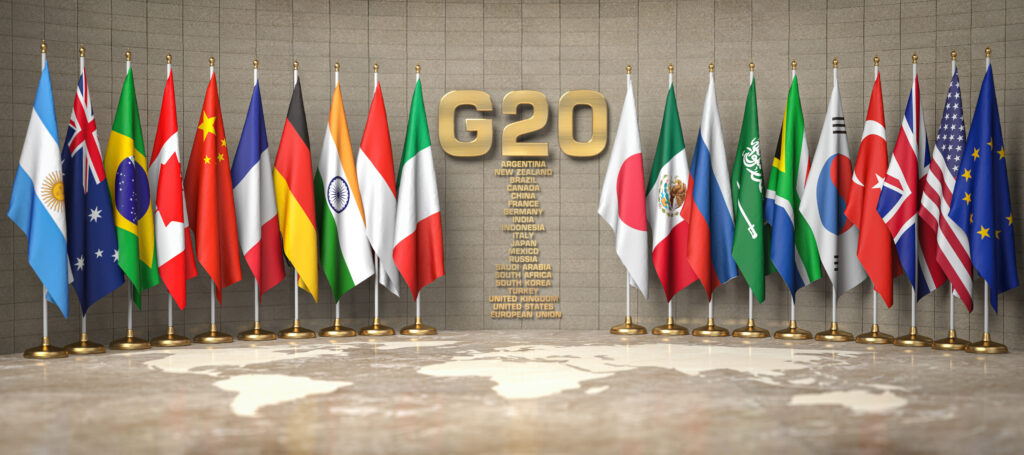In this Blue Year, the ocean has been at the heart of the international political agenda. After two weeks of negotiations, the COP27 ended on Sunday, 20th of November, with the adoption of the “Sharm el-Sheikh Implementation Plan”. On Wednesday 16th the final declaration of world leaders meeting in Bali for the G20 was published. What’s in it for the ocean?
An increasingly blue Conference of the Parties
For the first time, the COP27 hosted an Ocean Pavilion, organised entirely by a group of science- and research-focused institutions. More than 300 ocean related events were organised, showing the strong commitment of the ocean community. As reported by the Ocean & Climate Platform, several declarations have reinforced the recognition of the fundamental role of the ocean in the climate system, and the need to consider it as our best ally in the fight against climate change.
As in COP 26, the ocean held a place in COP27’s final declaration. The preamble affirms “the importance of ensuring the integrity of all ecosystems, including in forests, the ocean and the cryosphere, and the protection of biodiversity” and to “the critical role of protecting, conserving and restoring water systems and water-related ecosystems in delivering climate adaptation benefits and co-benefits, while ensuring social and environmental safeguards”.
Karina von Schuckmann, oceanographer specialised in ocean climate monitoring at Mercator Ocean International, attended COP27 in Egypt and participated in various sessions addressing several ocean topics from sea level rise, to ocean health, data accessibility, to climate risk in the Mediterranean Sea.
“The continuous improvement, integration, and use of best available ocean science, data and blue knowledge is essential to support the ocean-climate nexus at national and international level. Collaborative efforts by the ocean community – further strengthened during this COP – are then key to engage and to enable stronger global support for climate action and sustainable development, and to pave the way for robust, sustainable and effective ocean-based solutions, mitigation and adaptation options.”
Karina von Schuckmann

The Ocean 20 as an official G20 Engagement Group
The annual meeting of the heads of government of 19 of the world’s most industrialised countries plus the European Union ended last week. This year’s G20 was hosted by Indonesia and took place in Bali.
The international meetings earlier this year built confidence by showing that everyone has a role to play in achieving a sustainable ocean. It is to be noted that G20 countries are all coastal states, with 45% of the world’s coastlines among them, and they hold jurisdictional responsibility over 21% of exclusive economic zones. The G20 also accounts for 60% of the world’s population and 80% of the world GDP, 80% of global carbon emissions and 75% of global trade. It is probably with this in mind that the government of Indonesia together with the World Economic Forum launched Ocean 20 (O20), the new sustainable growth strategy for the G20. O20 aims to “deliver concrete actionable policy recommendations and strategies for cooperation, on priorities set by each rotating presidency, to spur investment and growth in the ocean economy while protecting, restoring and regenerating it”.
G20 Bali leaders’ Declaration

The G20 leaders signed the Bali Declaration, a non-legally binding document in which the heads of government express a common position on specific issues, published on November 16th. The document is structured on 52 articles, two of which are partially dedicated to the ocean and seas.
The G20 leaders engage to make progress towards the objective of ensuring that at least 30% of global land and at least 30% of the global ocean and seas are conserved or protected by 2030 (article 14). In article 15, the leaders mention the promotion of “scientific knowledge-sharing, raising awareness, and capacity building, particularly to advance on the ocean-based climate action.” They commit to end illegal, unreported and unregulated fishing and to develop an “international legally binding instrument on plastic pollution, including in the marine environment, with the ambition of completing the work by the end of 2024”.
On a highway to climate hell
Antonio Guterres, the ninth Secretary-General of the United Nations, opened the conference with the following words: “We are on a highway to climate hell with our foot still on the accelerator”. Considering the urgency pointed out by the latest scientific reports, including the IPCC 6th Assessment Report, which highlights the unprecedented acceleration of climate change and its impacts, there is an impellent need for undertaking rapid, immediate and transformational change. Mercator Ocean International – supporting the UN Ocean Decade baseline “the science we need for the ocean we want” – is committed to pushing the frontiers of the digital ocean to support the decision making for a blue future.
Mercator Ocean International commitment to the ocean we need
Known for its leading role in ocean reanalysis, monitoring and forecasting at European and global levels, MOi is committed to building a science-based Digital Ocean for supporting the conservation and the sustainable use of the ocean and its resources. It works to galvanise cooperation and dialogue between scientists, policymakers, public and institutional decisionmakers, as well as civil society towards the development and integration of ocean prediction and observation activities worldwide.
At the One Ocean Summit in Brest on February 10th, 2022, six countries (Italy, Norway, Portugal, Spain, UK, and France) signed the “Declaration of Brest” and committed to transform Mercator Ocean International into a Europe-centred Intergovernmental Organisation and to invite European coastal countries to join.
In late June 2022, IOC-UNESCO announced the launch of the OceanPrediction DCC (OceanPrediction DCC) and selected MOi to coordinate and host it. As a part of the UN Decade of Ocean Science for Sustainable Development, the two main pillars of the OceanPrediction DCC are international community-building and technical development. The OceanPredict DCC will create a coordinated global ocean prediction community and secondly will build a global technical structure focused on co-design, leveraging innovations of the digital twinning concept. MOi is currently engaged in the development of the EU Digital Twin of the Ocean, notably in infrastructure, IT, and modelling systems. On an international level, MOi stimulates partnerships, co-creates a system to implement community standards, and innovates ocean prediction activities to eventually merge with the digital twin of the ocean.
